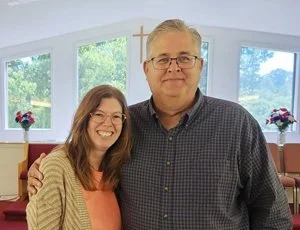Erika Kirk: ‘I Forgive Him’
By Rich Bitterman
The stadium is packed. Under the bright floodlights, sweat and dust stick to tongues. The roar of the crowd dies as the pulpit’s microphone cracks.
Erika Kirk stands at center stage, body trembling. The memorial hangs in the air like a dark cloud. Her husband Charlie’s name is on every pair of lips. She lifts her eyes, the hush pressing against her as if the wind itself is waiting.
And she says, firm yet fragile, “I forgive him.”
The words fall like stones. They scatter something inside the crowd. They echo off steel beams, bounce from seats. The scent of hot concrete and thousands of hearts pounding together mix in the heat: grief. Rage. Compassion. All braided together.
She could have left the anger alive, let it coil like a serpent around her spine. Her retribution register ringing.
She could have let the fire burn until her own skin was scorched. Many would. Many do. But there beneath the stadium lights, she trades rage for mercy. She trades shouts for words.
She trades debt for grace.
Jesus walked into a synagogue once. He saw a man who could not use his hand, withered. He felt the weight of that man’s pain. He glared into the hardness of surrounding hearts and did not retreat. In Mark, his anger was holy because it was born of love. He reached out. He healed.
Erika’s anger lives, but it is not in charge.
Something else carries her forward. Because forgiveness does not erase the wound. It does not silence the ache. But it pulls the poison out of blood, even if the scar burns.
In forgiving, she does not pretend justice does not matter. She assumes it does. She rests it in a larger story.
Peter asked Jesus: How many times must I forgive? Seven? Jesus said seventy times seven. It is a refusal to count offenses. Not a scoreboard. A surrender.
In the parable: a debt so monstrous that the figure collapses. From being kissed by grace to choking a man over coins. He demands payment. The King, seeing all, rages. Because if you have known mercy, how do you refuse it?
That gives shape to what’s happening tonight.
This forgiveness is not soft. It is a weapon drawn in surrender. It bears the mark of the cross. There is blood. There is blight. Charlie is gone. Yet forgiveness declares that even death does not have the final word.
In my living room watching, you can feel it. The hush presses into rib‑cages. Someone swallows. Someone weeps. A thousand hearts tremble. Some faces are pale. Some eyes shine with tears.
The crowd leans in. As if hearing the Gospel not in pat theology, but latched to bone. As if seeing the shape of love in her silhouette under light.
Christ commanded: “Be angry, sin not.”
Do not sleep angry. Let no sunset tug bitterness into your soul. Let anger die with the day. Do not feed resentment with memory. Do not fashion a coffin for hope with your own hands.
Resentment tells you things about yourself. That the gospel may still lie distant in your bones. That you have tasted forgiveness and not swallowed it. That your heart, soft at times, is edged with cold.
That you need again to look to Calvary. See the nails. Feel the crown. See the Innocent bleeding.
Hear him cry: “Father, forgive them.”
Erika is not acted by sentiment. She is acted upon by gospel. The weight of her grief hammered into something incomprehensible: courage. Love. Mercy.
She is the echo of that cross‑cry. She took the stones of grief and set them down.
There is sorrow here that demands voice. There is longing that resists easy comfort. There is the justice system turning its gears. There is the possibility: forgiveness may take time to root. May ache in the earth before blooming. But under stadium lights she plants it.
She tastes hot metal in her throat when she says “I forgive him.” Her hands tremble. Her heart wants to recoil, wants to scream…tears fall.
But she bows instead. She opens the door of her heart. She trusts something greater.
And you: who reads this. Who carries your own wound. Who corners yourself with memory.
You are invited: come take your feet out of the gravel. Shake them. Feel ground under skin. Let forgiveness be your step forward, not your burden.
So here is my challenge: in your darkest room, when your voice is raw, say the name. Speak it. Whisper: “I forgive you.” Let the air charge. Let the weight crack. Be afraid, tremble. But step anyway.
Because of what Erika did, we see the cross awkwardly alive.
Because of what Christ endured, we understand forgiveness is not retreat. It is surrender. It is facing hell and singing resurrection. It is taking loss and playing it into melody.
It is the bravest love.
We were not made for bitterness. We were made for forgiveness. Taste it. Say it. Live in it. Tonight.
Above content found and published with permission at My Bible Thoughts With Pastor Rich.
I’m Pastor Rich Bitterman, a country preacher from the Ozarks. Guy Howard, the old Walking Preacher, once wore out his boots traveling from church to church, meeting strangers and sharing the gospel. I’m doing the same today on digital roads. Each post is a visit. Each verse is a step. Let’s walk the Word together.


